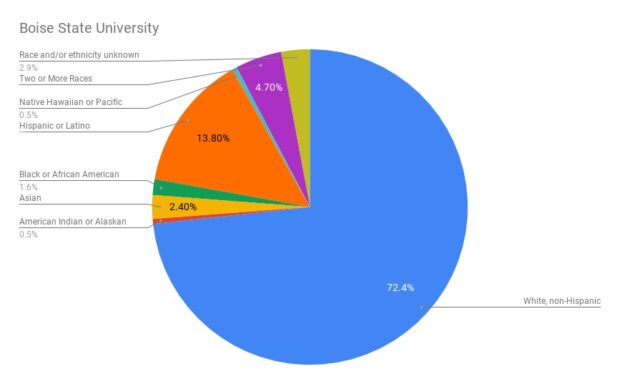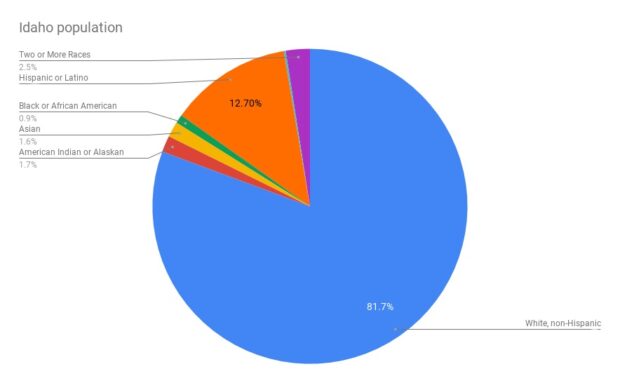Kameelah Diaz thought she knew what to expect when she moved from Indiana to Boise for her freshman year of college.
But the transition from Indianapolis — where most of Diaz’s classmates were students of color — was more jarring than she’d anticipated.
Diaz, a first-generation college student who identifies as both black and Mexican, felt isolated.
“I’d go into these classes and I’m the only person of color. I’m the only person who is black. And it feels a little bit harder to go up to people when you’re the only person of color in a room,” she said. “It’s really intimidating.”
Diaz called her mom regularly those first few months, asking if she could transfer schools. She missed her parents. She missed her friends. And she didn’t feel like she had a community at Boise State University.
That changed at the end of her first semester, when Diaz went to an event called Talk-O-Tuesday hosted by the Martin Luther King Jr. Living Legacy committee. She met representatives from student groups such as the Black Student Association, talked to other students with shared campus experiences and found a community where she felt cared about and supported.
“It would have been so much more stressful, so much more challenging if I didn’t have access to those resources,” Diaz said of programs for multicultural and first-generation students. “I probably would have transferred back home.”
Today, Diaz works to expand the programs that supported her. She’s the president of the Black Student Association and works at the campus Gender Equity Center. (Her opinions, she’s quick to point out, are her own, not those of her employer or the school).
It was confusing, then, when Diaz read a letter sent from 28 Republican legislators to Boise State President Marlene Tromp last week, asking Tromp to forgo university support for diversity events and initiatives. The push toward diversity and inclusion, legislators argued, becomes “divisive and exclusionary” by segregating students.
“These events are open to everybody,” Diaz said. “They’re welcoming. They’re loving. In no way are they trying to put down anybody else.”
The letter has driven division in the Statehouse over programming at Idaho’s public universities. After the letter from House Republicans, Democratic lawmakers urged Tromp to stay the course, applauding Boise State’s work toward inclusion.
The debate over campus inclusion efforts is not unique to Idaho. But as lawmakers on both sides of the aisle argue the issue, some students are standing in solidarity with Boise State’s programs. Students Ryann Banks and Abby Barzee and Diaz are hosting a rally at the Idaho State Capitol on noon Saturday. They’ve also launched a petition drive asking Republican representatives to rescind the letter.
“We want this to be more of a community building stance of solidarity, rather than an attack on the people who wrote the letter,” Diaz said. “We know the help, love and the support we’ve gotten from these departments and we don’t want anything to change in the coming years.”
Boise State Diversity and Inclusion Rally: Saturday, July 20, 12 to 2 p.m. Idaho State Capitol, Boise.
The rise of campus diversity initiatives
Archie Ervin, president of the National Association of Diversity Officers in Higher Education, says diversity and inclusion efforts have been “a major agenda” at universities for the past 25 years or so.
The liberal-education focused Association of American Colleges & Universities has been promoting and researching diversity and equity on campus since the 1970s. Today, the research-focused Association of American Universities espouses the importance of diversity efforts.
“The evidence is clear: Providing strategic intervention, where students begin to feel an ownership and identity with institutions is important for their mental framework, as well as their ultimate academic performance,” said Ervin, chief diversity officer at the Georgia Institute of Technology.
Diversity initiatives are not new at Boise State. The university created a student diversity and inclusion director’s position in 2008. In 2017, former President Bob Kustra’s office adopted a diversity and inclusivity statement, promising that Boise State “celebrates, and values diversity, and expects and fosters inclusivity at all levels.”
Pushback from legislators isn’t limited to Idaho.
Three years ago, the Tennessee legislature slashed $436,000 in funding for diversity and inclusion at the University of Tennessee at Knoxville, Inside Higher Ed reported. The move prompted protests from students and even after the cuts, the university promised it was “committed to creating a welcoming environment.” The following year, program funding was restored.
What does diversity and inclusion look like at Boise State?
Boise State’s undergraduate population is more racially diverse than the state that surrounds it.


Through organizations such as Multicultural Student Services, Student Diversity and Inclusion and the Gender Equity Center, the school offers resources to support students from different ethnic and cultural backgrounds, students in the LGBTQ community and first-generation college students.
A June letter written by Boise State Interim President Martin Schimpf celebrated these efforts. “It is clear to me that students, faculty and staff across campus understand the importance of Boise State being a leader on inclusive excellence – not only because it is the right thing to do, but because it is vital to maintaining our ability to serve our students into the future.”
Schimpf’s letter prompted the Republican lawmakers’ response. Written to Tromp, Schimpf’s replacement, the letter decried diversity and inclusion efforts such as Black Graduation, bias training and fellowships for minority students, calling the programs “antithetical to the Idaho way.”
But what are these programs — and what exactly do they do?
- Black and Rainbow Graduation are among a number of commencement events at the university celebrating students of different backgrounds. Rainbow Graduation celebrates LGBTQIA+ and allied graduates. Black Graduation, hosted by the Boise State University Black Alumni Chapter, invites people to “collectively rejoice in a cultural celebration of excellence, academic honor and communal celebration.” Diaz says each event is open to all. (Other campus ceremonies celebrate first-generation graduates, international students and other student groups.)
- Project: Dream for Tomorrow, a two-day event hosted by the Boise State Organización de Estudiantes Latino-Americanos, is designed to expose high school students to campus life and resources.
- Seven Arrows Powwow, an April competition hosted by Boise state Multicultural Student Services, showcases Native American cultural traditions.
What happens next
Boise State’s reply to legislators has been measured.
In a statement, Tromp called for “meaningful dialogue that underscores our common commitment to the well-being of our students and to the future of the state.”
While her statement didn’t get into the specifics of her plans, she did say Boise State will “foster and protect the open exchange of ideas in order to ensure a broad and deep educational experience.”
Diaz believes that means a continued commitment to inclusion. She and her fellow organizers have been communicating with Tromp’s office since inviting her to Saturday’s rally, and they view that as a positive sign.
“I definitely think that Boise State has a lot more growing to do,” she said. “The only way that we’re going is up, and I’m excited to see what other changes Boise State is going to make.”
Read the Republican lawmakers’ letter in full.
